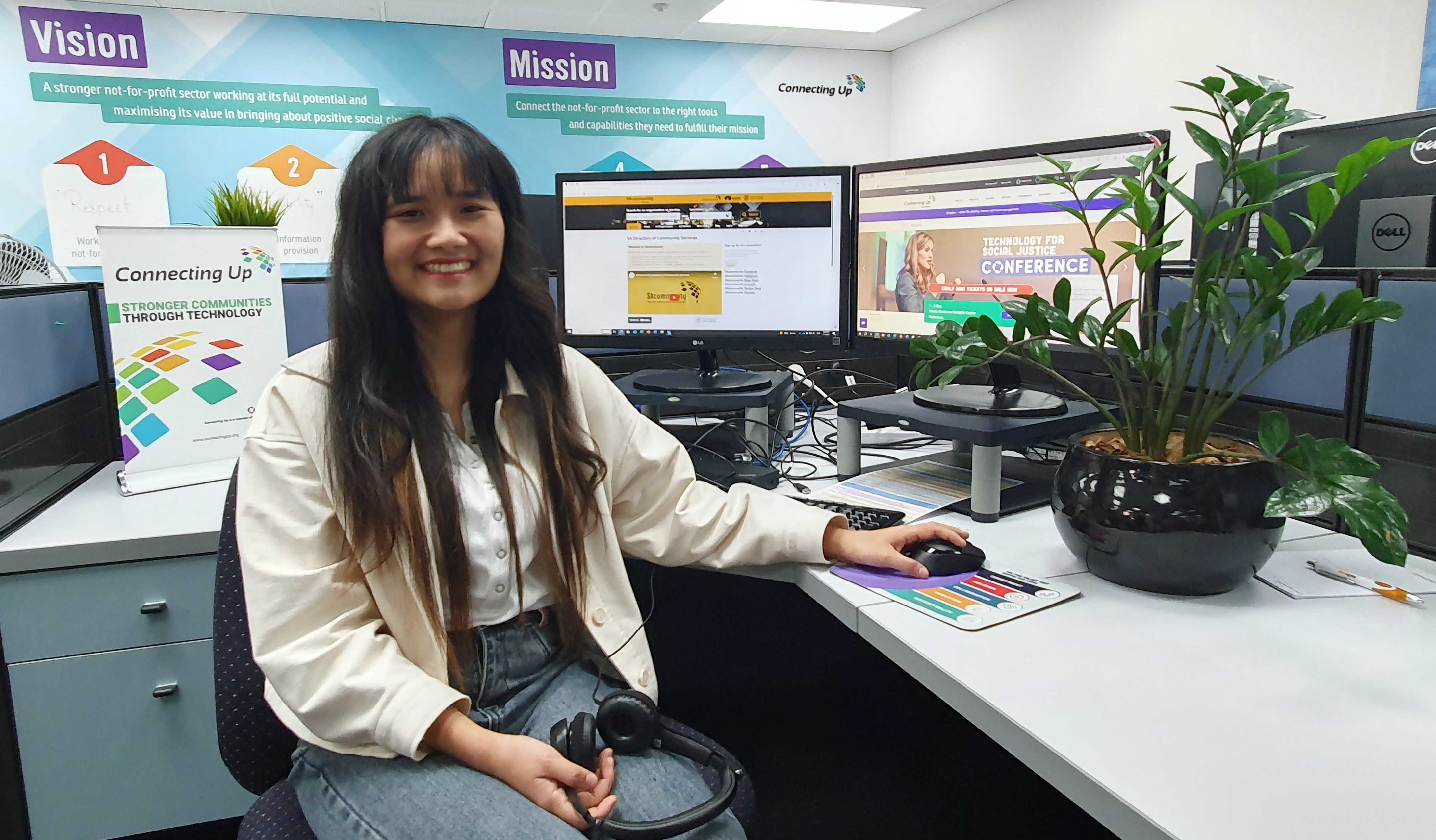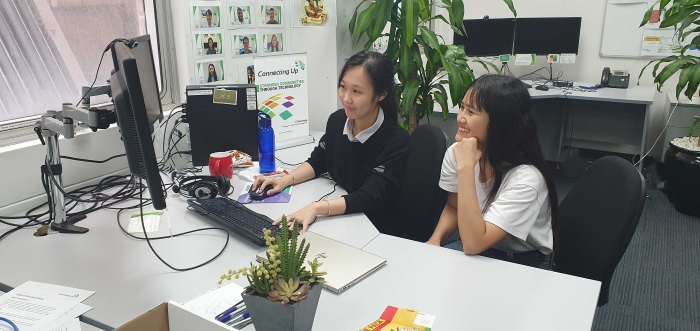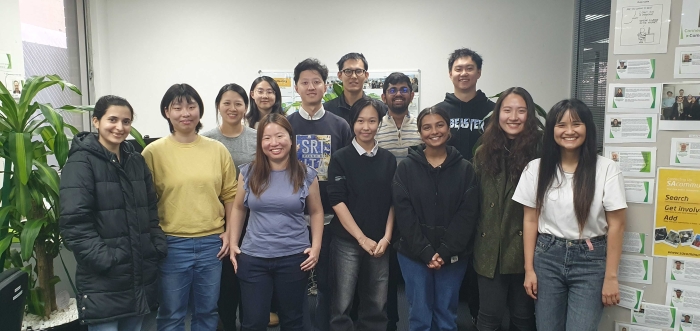Adelaide University Internship Experience - Olivia Thi Kim Oanh Nguyen

Welcome Olivia!
Olivia Thi Kim Oanh Nguyen joined our SAcommunity Data Analytics Team for her University of Adelaide SET (Sciences, Engineering and Technology) Internship for her Masters of Data Science Trimester 1, 2024: 27 February 2024 - 31 May 2024.
She is completing a 280 hour internship onsite with SAcommunity at the Connecting Up Office, Infoxchange for 3 days (22.5 hours) a week for ~14 weeks around her classes.
Total Hours 161 Joined 27 February 2024 Last Check-in 8 May 2024
Personal Biography
Olivia is in her second year of a Master of Data Science at the University of Adelaide 2023-2024. She has a Bachelor of Business and Law from HCMC University of Law 2014, and previously worked as a corporate legal assistant. Here she focussed on commercial contracts and company dispute resolution, whilst running a small business, the Wanfu Trading Service Company, in Vietnam. Aware of the importance of data-driven decision-making for business, Olivia made her career change and moved to Australia, building her knowledge of statistics and machine learning through the curriculum, in big data analysis and machine learning courses.
Currently, she is working on her graduate research project involving predicting the outcomes of tennis matches using the R language, a programming language for statistical computing and data visualization. This project allows her to enhance her skills in building and enhancing predictive models, combining different predictors to create new useful predictions, and in applying statistical modelling techniques. Her goal for this project is to achieve an 80% accuracy rate in predicting the winners of matches, not only in tennis but also with sports in general.

Intern Olivia's three-year comparison reports
Community Services in Councils Project
Olivia has selected Wattle Range for her Power BI council reports, a database of approximately 120 community services operating in the area for the financial years 2020-2021, 2021-2022 and 2022-2023. Her reports can be found >>here. There are a number of steps involved once community service information data presentations are created, a summary of data trends prepared, work is attributed and published to the website, and then will be introduced by Olivia to council stakeholders by phone and email to be used as a tool to understand community needs in their area.

27 February 2024
5 March 2024
- I must prepare a concise version of my presentation in case of unexpected situations where I may not have enough time to finish as planned. This version should include all main points to ensure understanding.
- When crafting email subjects, I must ensure that they clearly outline the purpose of the email, include specific tasks with due dates if applicable, and contain only essential information for the recipient.
- When receiving emails, it's necessary to delegate tasks when appropriate, promptly address emails upon receipt by either responding immediately or scheduling a follow-up if necessary, and refrain from sending emails over the weekend to respect recipients' personal time.
- I will try to reach the person before cc'ing their manager or cc'ing their other peer in case they are away.
13 March 2024
29 February 2024
20 March 2024
The webinar was delivered by Jim O’Shea Gumbaynggirr man from New South Wales and Chief Operating Officer at VACCHO, Victorian Aboriginal Community Controlled Health Organisation Inc. In this webinar, he outlined principles and frameworks for Indigenous data sovereignty, emphasizing the importance of Indigenous communities having control over the collection, ownership, management, and use of their data. The CARE principles focus on Collective benefit, Authority to control, Responsibility, and Ethics, emphasizing minimizing harm, maximizing benefit, ensuring justice, and considering future use. The FAIR principles stress that data should be Findable, Accessible, Interoperable, and Reusable, promoting data usability and accessibility. In Australia, principles include controlling the data ecosystem, contextual and disaggregated data collection, and ensuring relevance and sustainability. Additionally, practical tips were shared from his discussion with Infoxchange’s staff for preparing data requests to the government. After this webinar, I acknowledge more about how to protect Indigenous data sovereignty and ensure that Indigenous communities have control over their data. I now understand the importance of principles such as CARE and FAIR in guiding data management practices. Additionally, I have gained practical insights into preparing data requests to the government, which is crucial for Indigenous communities seeking to access government data.
Mentor Meeting 10 May 2024
Connecting Up Volunteers and Interns are provided with the opportunity to select staff members from across the wider Infoxchange organisation for an informational mentor meeting. Here they have the opportunity to ask more about staff members job roles and employment journey, and learn about their career and professional development, to gain insights and guidance that can be applied towards their own success.
Volunteers and interns both prepare 5 questions for their mentors and then are encouraged to record 5 aspects they felt were helpful for them to share on their portfolio for both themselves and other volunteers, and Olivia shared her experience in meeting David, IT Project Manager, Infoxchange.
David was incredibly friendly and genuine with us. The way he answered our questions reflected the qualities of a good senior and a supportive brother, showing his genuine desire to help us navigate the industry. The first question, which Kristen asked about what we need to prepare for getting a job, and I added whether we need to master all skills before landing a job, he emphasized that what companies look for in a candidate is a good attitude and a willingness to study more. He encouraged me to pursue job opportunities and learn the necessary skills along the way, even if I am not an expert in them initially. He never regretted not studying IT initially; his background in civil engineering has given him a broader perspective on work and decision-making.
Regarding the second question about skills for advancement, David's career progression from associate consultant to junior consultant, and then to senior consultant in just three years, left me with the most impression. He highlighted the importance of planning for the skills, tasks, and objectives required for a higher position, and then acquiring the necessary skills to fulfill these requirements. He emphasized the importance of being proactive in seeking out new projects and demonstrating the ability to handle tasks and overcome challenges. He mentioned that he moved to a new company to expose himself to a variety of skills, areas, and tasks, emphasizing the importance of continuous learning and self-improvement.
For the third question about project experience and lessons learned, when I believe I learn better from mistakes. He emphasized the importance of not repeatedly asking the same questions, checking all information and necessary resources before seeking assistance, and setting boundaries for workload to avoid overwhelming oneself. He stressed the need to understand my limitations and avoid taking on tasks that exceed my capacity.
When asked about collaboration and networking, David advised that while fostering personal friendships with colleagues is beneficial, it should not be forced. He ensured colleagues are individuals who can provide job references and introductions to desired tasks or positions.
Finally, when asked for career path advice, David emphasized the importance of staying updated with the job market trends. He advised regularly assessing the job market to identify positions in demand and aligning my career path accordingly.
Digital Training & Development
Volunteers and interns have access to the Connecting Up Digital Learning Platform providing live webinars and recorded webinars, workshops and webcons presented by subject-matter experts to understand more about a range of technology topics for the not-for-profit sector.
Relevant training sessions were selected, attended, summarised and assessed by Olivia to look at how these sessions can enhance her internship experience have included:
 Intern Olivia watched one of the recorded webinars
Intern Olivia watched one of the recorded webinars
Volunteers and interns have the opportunity to learn from useful recorded seminars. One such seminar is the Data Readiness, which is delivered by Sam Headberry, who has 12 years of professional experience working in some of Australia's largest housing and homelessness organizations in Australia. Sam is passionate about data and using information technology to boost outcomes in the non-profit sector. During his seminar, he emphasized that organizations must prioritize robust data management strategies that enable effective decision-making through data. This involves understanding the organization's information architecture, data flows, and context - utilizing structured formats, identifying relationships between datasets, and recognizing why data is collected. It requires addressing challenges around disparate data storage systems and types by reducing sources, integrating data, and leveraging visualizations. He also discussed that organizations should centralize data sources, limiting the number of systems, and carefully select appropriate systems with stakeholder input to meet their needs. Olivia has shared her key takeaways from the seminar below. My key takeaways were:
- When good data goes in, we have great insights out, reminding me to know the reasons and the goals I want to collect this information.
- Data is meaningful only when in context. When collecting and analyzing data, I must know the relationships of these datasets and how they connect to my problem statement and the organization's background and available resources.
- Centralizing the data sources helps eliminate redundancies, improves data quality, and allows for more integrated analysis by bringing disparate data together into a unified system or platform.
A Practical Introduction to Power BI
Another recording seminar that Olivia watched was the A Practical Introduction to Power BI webinar delivered by Marcus Harvey, who leads Infoxchange's IT consulting and services teams in Australia and New Zealand. He and his team are enthusiastic about assisting organizations in leveraging technology to operate more efficiently, aiming for tangible results for their clients and the communities they serve. During his seminar, he discussed that effective data management and analysis require integrating disparate data sources into a unified view, understanding dataset context and relationships, and enabling collaborative sharing of insights within the organization. A data-driven approach helps identify trends, improvement areas, and resource optimization based on client demographics, outcomes, and funder targets. However, he also showed that this necessitates addressing data quality issues, securing organizational commitment with dedicated resources, and taking a strategic approach guided by specific questions or hypotheses. Olivia has shared her key takeaways from the seminar below. My key takeaways were:
- Power BI enables integrating data from multiple sources for comprehensive analysis and insights with a uniform view of all filters. With Power BI, I can refresh and connect different data sources. I can also make my own queries and share insights within the organization through collaborative sites and track outcomes activity.
- It's crucial to understand the context, meaning, and relationships within datasets to derive valuable insights. I need to be careful with errors in data when it gives results that cannot be trusted. In this case, it is better to fix the solution at the source when the information is entered in the first place.
- Instead of spending a lot of time wandering, it is best to start with a specific hypothesis or question and build a report or dashboard to answer these questions using charts, graphs, and filters.
Sign up for the newsletter!
Subscribe to our monthly newsletter to receive news, information and events for the community sector in SA












